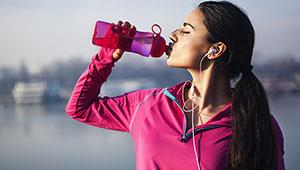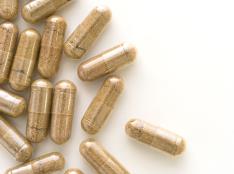
How Much is Too Much?
The recommended performance-enhancing dose of caffeine is about 1.5 milligrams per pound (3 mg/kg) body weight. This can be consumed one hour before an event, and/or during the event, such as a caffeinated gel or defizzed cola every hour. Triathletes commonly consume caffeinated gels before each segment, to distribute the caffeine throughout the event rather than having a big pre-race jolt that may make them feel shaky and unable to concentrate.
Some athletes delay their caffeine intake until fatigue sets in, and then ingest 0.5 to 1 milligram per pound (1 to 2 mg/kg) body weight.
The ergogenic effects of caffeine max out at about 200 to 250 milligrams, which is much less than the amount previously recommended. When it comes to caffeine, more is not better. Experiment during training to learn what amount (if any) works best for your body.
While caffeine may give you a boost in your endurance event, consuming too much could potentially hinder your performance. Let's say for example you're running, rowing, or swimming in more than one competitive event in the same day. If caffeine helps you go harder in the first event, will that "fry" you for the second event? Can another dose of caffeine counter your fatigue?
With a weekend tournament, will too much caffeine on the first day ruin your sleep so you're unable to perform as well on the second day? More research is needed to answer these questions, but these situations demonstrate why you should opt for the smallest effective dose of caffeine.
When it comes to young athletes, parents should use caution before allowing their kids to use caffeine. Again, no amount of caffeine will compensate for lousy fueling.
Also, be aware of the rules for caffeine use in your sport. In 1984, the International Olympic Committee (IOC) and the World Anti-Doping Agency (WADA) banned the use of caffeine in competition, but in 2004, WADA reversed the ruling, when new research indicated the amount of caffeine needed to reach the threshold dose was detrimental to performance.
Although caffeine is no longer banned by WADA, it's on the banned list for the NCAA, the governing body of collegiate sports. Collegiate athletes can be cited for doping if their caffeine level is higher than 15 micrograms/ml urine. (A normal urine caffeine level is between 1 to 2 micrograms).
Remember, caffeine does not affect all athletes in the same way. Make sure to assess what works best for you.
For even more helpful tips and tid-bits, get a copy of Caffeine for Sports Performance. You'll actually stay awake while reading it; this book is not a snoozer.
More: The Caffeinated Runner
 Perfect your nutrition to boost your performance. Sign up for a race near you.
Perfect your nutrition to boost your performance. Sign up for a race near you.
- 2
- of
- 2
About the Author










Discuss This Article